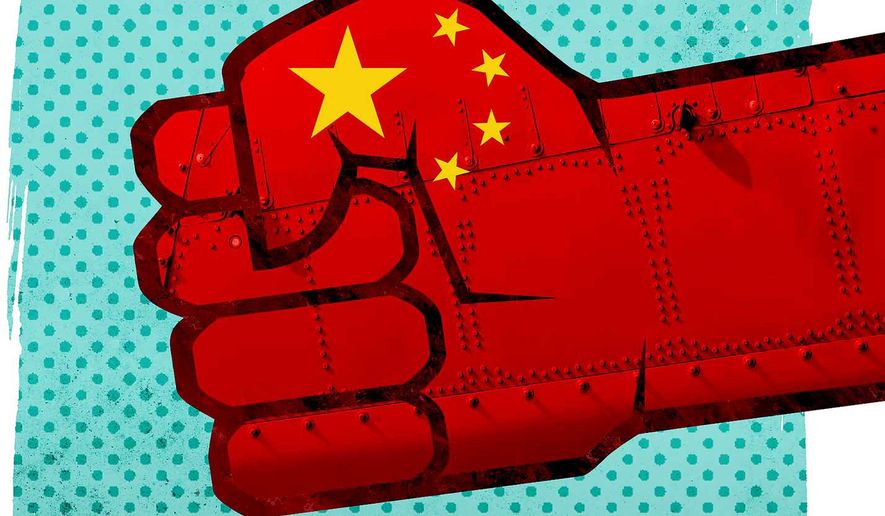OPINION:
While we can all sympathize with the struggle of its valiant people, Ukraine isn’t vital to our security — unlike Taiwan. While great at brutalizing a small neighbor, without nuclear weapons, the Russian army is not a force to be reckoned with. The People’s Liberation Army is bent on world domination.
The Biden administration’s blunders are a green light for Chinese aggression: our humiliating retreat from Afghanistan, kowtowing to the left by leaving our southern border wide open, making America energy poor and now our pathetic, toothless response to Russian President Vladimir Putin’s war on Ukraine.
Is there a difference between Taiwan and Ukraine? Absolutely. The United States never committed to aiding Ukraine’s defense. Even though the 1979 Taiwan Relations Act is marked by what’s called “strategic ambiguity,” the U.S. has promised (at the very least) to provide the island democracy with the means to defend itself.
There is no way for America to join the land war in Ukraine directly. In Asia, we have the Seventh Fleet. Since the end of the Chinese Civil War, Beijing has clung to the dangerous delusion that the Republic of China (ROC/Taiwan) is part of the People’s Republic of Gulag.
In the past 130 years, Taiwan was ruled by the mainland for only five years (1945 to 1949) — and then by the Nationalists, never the Communists. Saying that Taiwan, which developed a separate national identity over seven decades, is part of China, would be like saying that at the time of our Civil War, the United States was part of Britain.
Beijing thinks Taiwan is its 34th province. The Taiwanese shudder at the thought.
What would the communist conquest of Taiwan mean? In practical terms, the PRC would control both sides of the Taiwan Strait — one of the most important shipping lanes in the world — with the ability to close it at will.
Taiwan’s economy (with the 21st largest GDP in the world) would be absorbed by China. This includes its crucial microchip industry. The ROC manufactures 63% of the global supply of semiconductors.
In the war between freedom and totalitarianism, the latter would be very much in the ascendancy.
Anyone who thinks Chinese expansion would stop with Taiwan hasn’t thought about it enough. Even if nominally independent, Japan, the Philippines and all of Southeast Asia eventually would come in the sphere of influence of the world’s most brutal regime.
Chinese President-for-life Xi Jinping believes that representative government and human rights are outmoded concepts. China thinks its totalitarian system with some market elements is the wave of the future and will come to rule the world, just as the American model dominated the post-World War II era.
In May 2019, the People’s Daily (official organ of the Central Committee of the Chinese Communist Party) declared a “people’s war” on America. This is not bluster, but a candid statement of reality. Espionage, technology theft, bribery and some would say bio-warfare are fronts in this world war. But the most important is its campaign to conquer Taiwan. If it succeeds, it will undermine our alliances throughout the region and weaken our strategic position worldwide.
Does China have the capacity to take Taiwan? That’s debatable. Its navy now includes 355 warships to our 296. Our Navy is marked by decades of neglect. Their navy is up-to-date.
The 2003 Foreign Relations Authorization Act designates Taiwan “a major non-NATO ally” of the United States.
The 1979 Taiwan Relations Act and its successor require us to provide Taipei with “arms of a defensive character.”
It also requires us to “maintain the capacity of the United States to resist any resort to force or other forms of coercion that would jeopardize the security, or the social or economic system, of the people on Taiwan.”
What does “resist any resort to force” mean? Therein lies the strategic ambiguity.
Around the world, aggressive regimes are on the march — in Europe, the Middle East and Asia. Wars of conquest must not be viewed in isolation but as part of an international struggle between freedom and slavery — the ballot box and the iron fist. We can’t do much for the Ukrainians. We can and we must for the Taiwanese.
The time for ambiguity is over. Unless we want to see another free people swallowed by a totalitarian power, we must state — loudly and unambiguously — that we will join in the defense of Taiwan.
• Don Feder is a former Boston Herald writer and syndicated columnist.




Please read our comment policy before commenting.